 This week brings our attention to what is, arguably, one of the most significant nominations in the history of the Best Supporting Actress category. Since embarking on my Supporting Actress Sunday project three years ago, notions of "category fraud" have haunted my evolving study of what I call "actressing at the edges." What's too big? What's too small? It's created a curious conundrum, as I've never been much of a size queen when it comes to actressing. I can see the case for Cate Blanchett "as supporting" for Notes on a Scandal and have no problem whatsoever with Beatrice Straight taking home the trophy. And I have mixed feelings about the idea that "Best Supporting" does not have room for what are increasingly considered "Limited or Cameo" roles. Indeed, after a few years of doing this, I have gotten to a place where I just don't go for the "not enough" or "too much" screentime arguments. For me, what makes a worthy supporting actress nomination is (a) a secondary but instrumental contribution to the central narrative and (b) a memorable, emotionally clarifying character arc conveyed by the performance itself. Screentime, number of scenes, and/or percentage -- while fascinating in terms of trivia, context and proportion -- ultimately matter little to my assessment of what is or what is not truly great actressing at the edges. And these convictions have only been fortified by my careful contemplation of this week's nominated performance, the shortest yet so honored. Of course, I'm talking about...
This week brings our attention to what is, arguably, one of the most significant nominations in the history of the Best Supporting Actress category. Since embarking on my Supporting Actress Sunday project three years ago, notions of "category fraud" have haunted my evolving study of what I call "actressing at the edges." What's too big? What's too small? It's created a curious conundrum, as I've never been much of a size queen when it comes to actressing. I can see the case for Cate Blanchett "as supporting" for Notes on a Scandal and have no problem whatsoever with Beatrice Straight taking home the trophy. And I have mixed feelings about the idea that "Best Supporting" does not have room for what are increasingly considered "Limited or Cameo" roles. Indeed, after a few years of doing this, I have gotten to a place where I just don't go for the "not enough" or "too much" screentime arguments. For me, what makes a worthy supporting actress nomination is (a) a secondary but instrumental contribution to the central narrative and (b) a memorable, emotionally clarifying character arc conveyed by the performance itself. Screentime, number of scenes, and/or percentage -- while fascinating in terms of trivia, context and proportion -- ultimately matter little to my assessment of what is or what is not truly great actressing at the edges. And these convictions have only been fortified by my careful contemplation of this week's nominated performance, the shortest yet so honored. Of course, I'm talking about...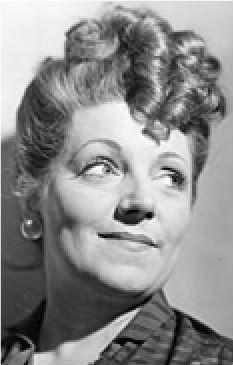

...Hermione Baddeley in Room at the Top (1959)
approximately 2 minutes and 26 seconds
4 scenes
roughly 2% of film's total running time
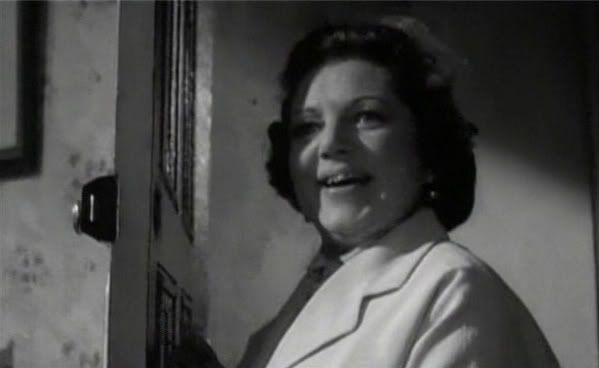 On first glance, Baddeley's Elspeth seems like a respectable, working-class British matron but, through Baddeley's deft characterization, closer inspection reveals that her nice hat and cloth coat are merely professional drag (for her day job as music coach for aspiring actresses).
On first glance, Baddeley's Elspeth seems like a respectable, working-class British matron but, through Baddeley's deft characterization, closer inspection reveals that her nice hat and cloth coat are merely professional drag (for her day job as music coach for aspiring actresses).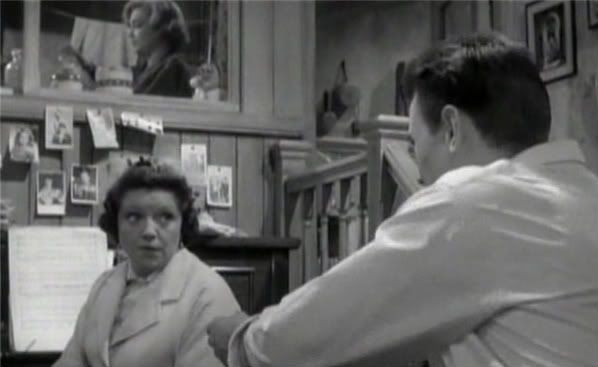 Baddeley's Elspeth is a worldly woman -- world-weary even -- whose hard-earned cynicism hasn't yet fully corroded her belief in the transformative possibility of real love.
Baddeley's Elspeth is a worldly woman -- world-weary even -- whose hard-earned cynicism hasn't yet fully corroded her belief in the transformative possibility of real love.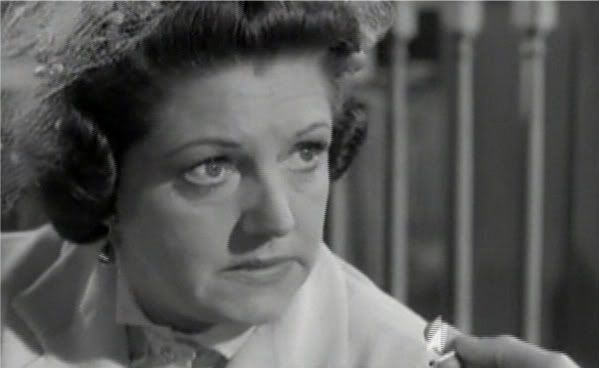 In her first brisk establishing scene, Baddeley babbles nearly nonstop and Baddeley's distinctive warbly patter establishes Elspeth's backstory with a welcome jolt of effervescent wit. At the same time, however, Baddeley's Elspeth scrutinizes Alice's new beau (an excellent Laurence Harvey), and the actress's wide open gaze serves as an interrogator's lamp as the character seeks clues for how this man might hurt her dear dear friend.
In her first brisk establishing scene, Baddeley babbles nearly nonstop and Baddeley's distinctive warbly patter establishes Elspeth's backstory with a welcome jolt of effervescent wit. At the same time, however, Baddeley's Elspeth scrutinizes Alice's new beau (an excellent Laurence Harvey), and the actress's wide open gaze serves as an interrogator's lamp as the character seeks clues for how this man might hurt her dear dear friend.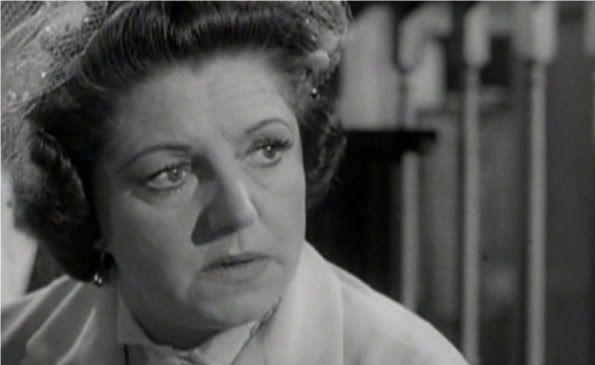 Baddeley's casting in the role is brilliant. The actress's distinctive presence -- a memorable blend of agitation and comic frivolity -- combines with the character's protective devotion to her friend and makes Baddeley's Elspeth a palpable blast of warmth in this otherwise dreary and chilly film.
Baddeley's casting in the role is brilliant. The actress's distinctive presence -- a memorable blend of agitation and comic frivolity -- combines with the character's protective devotion to her friend and makes Baddeley's Elspeth a palpable blast of warmth in this otherwise dreary and chilly film.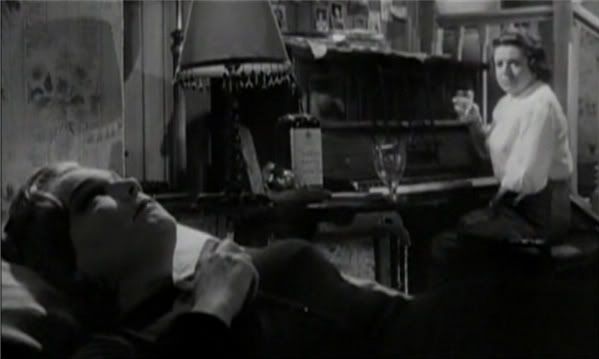 Elspeth's "first impression" becomes all the more essential to Baddeley's characterization (and to the film as a whole) when next we see Elspeth, after Alice's climactic "suicide-by-drunk-driving" death.
Elspeth's "first impression" becomes all the more essential to Baddeley's characterization (and to the film as a whole) when next we see Elspeth, after Alice's climactic "suicide-by-drunk-driving" death.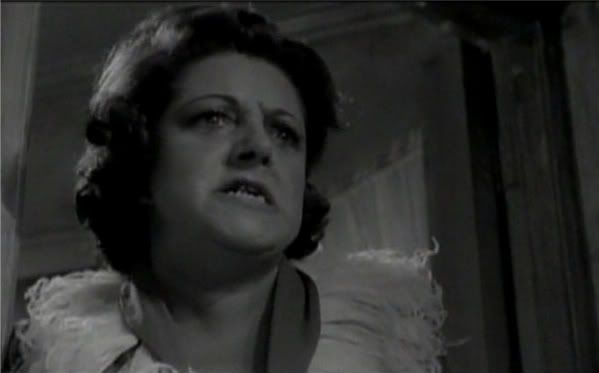 When a stunned Joe arrives to Alice's flat shortly after hearing the news, Elspeth confronts the man she holds directly responsible with shrieking accusations. This electrifying scene is important for two main reasons. Most obviously, Baddeley's Elspeth is utterly transformed, her hair a mess and her faces contorted into a shocking series of gruesome grimaces. More subtly, Baddeley's Elspeth does in this scene exactly what she did in Joe's first encounter with her: she mirrors the emotional truth of the situation. Recall that it was Baddeley's Elspeth who first said that Alice loved Joe, just as it was Elspeth to whom Joe first confessed his deep feelings for Alice. In this second scene too, then, it's Baddeley's Elspeth who witnesses the emotional truth of Joe's situation -- how Joe used Alice, how Alice threatened to get in the way of Joe's ambition, how Joe's emotional cowardice created the circumstances that led to Alice's suicide. And most importantly, it's Baddeley's warbling voice that scores the entire encounter.
When a stunned Joe arrives to Alice's flat shortly after hearing the news, Elspeth confronts the man she holds directly responsible with shrieking accusations. This electrifying scene is important for two main reasons. Most obviously, Baddeley's Elspeth is utterly transformed, her hair a mess and her faces contorted into a shocking series of gruesome grimaces. More subtly, Baddeley's Elspeth does in this scene exactly what she did in Joe's first encounter with her: she mirrors the emotional truth of the situation. Recall that it was Baddeley's Elspeth who first said that Alice loved Joe, just as it was Elspeth to whom Joe first confessed his deep feelings for Alice. In this second scene too, then, it's Baddeley's Elspeth who witnesses the emotional truth of Joe's situation -- how Joe used Alice, how Alice threatened to get in the way of Joe's ambition, how Joe's emotional cowardice created the circumstances that led to Alice's suicide. And most importantly, it's Baddeley's warbling voice that scores the entire encounter.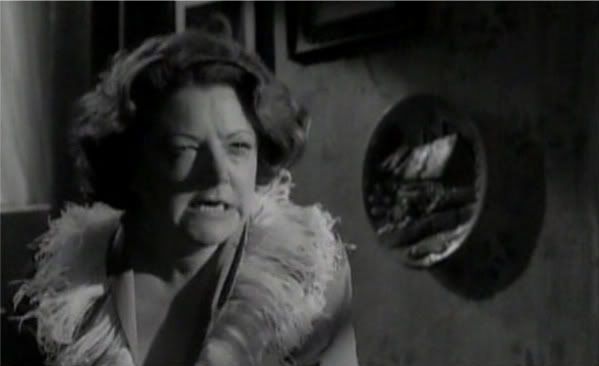 With this scene, it becomes clear: in both of their brief encounters, Baddeley's Elspeth literally calls Joe out -- both on how he's feeling and what he's done -- in shockingly and aurally vivid ways. All of which make Joe's inability to answer Elspeth's final question -- Why?!? -- even more devastating in its hollow silence.
With this scene, it becomes clear: in both of their brief encounters, Baddeley's Elspeth literally calls Joe out -- both on how he's feeling and what he's done -- in shockingly and aurally vivid ways. All of which make Joe's inability to answer Elspeth's final question -- Why?!? -- even more devastating in its hollow silence.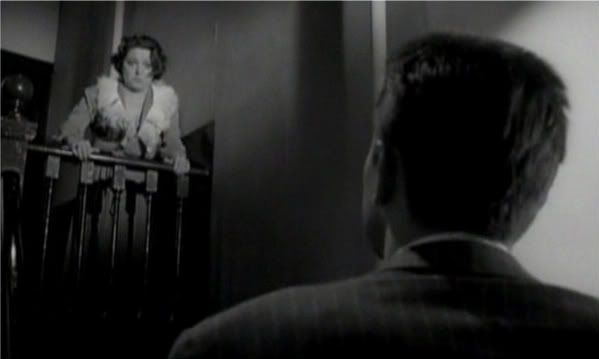 But Baddeley's work in the film is not finished when she shrieks her final spoken line. Rather, she returns -- silent for the first time -- to stand as mournful witness to the film's concluding wedding sequence.
But Baddeley's work in the film is not finished when she shrieks her final spoken line. Rather, she returns -- silent for the first time -- to stand as mournful witness to the film's concluding wedding sequence.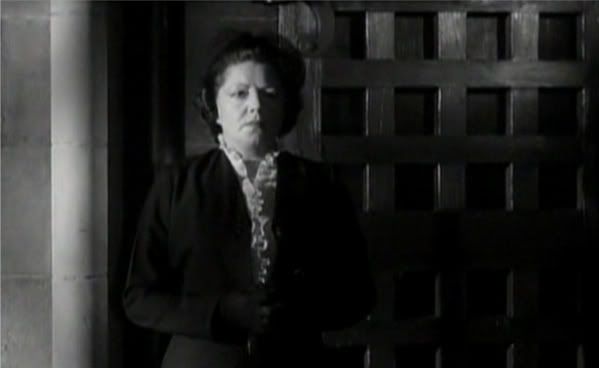 As Baddeley's Elspeth stands in the rear of the chapel, dressed like she was going to a funeral instead of a wedding, her wordless silence testifies to Alice's absence -- the woman she and Joe both truly loved -- from the sanctification of marital love. Here again, Baddeley's wide gaze searches Joe for his capacity to do the right thing and those same eyes register her disappointment at his failure.
As Baddeley's Elspeth stands in the rear of the chapel, dressed like she was going to a funeral instead of a wedding, her wordless silence testifies to Alice's absence -- the woman she and Joe both truly loved -- from the sanctification of marital love. Here again, Baddeley's wide gaze searches Joe for his capacity to do the right thing and those same eyes register her disappointment at his failure.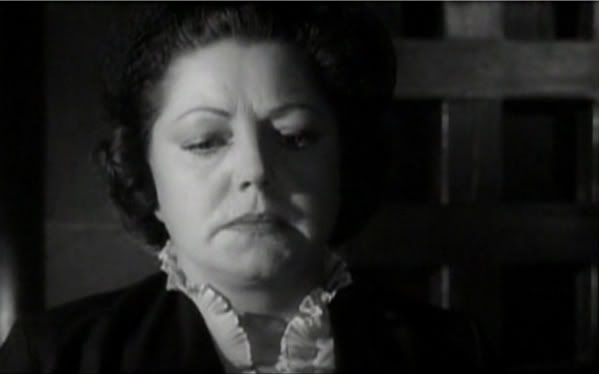 As what is nearly certainly the briefest performance yet to be nominated for any acting award, Hermione Baddeley's performance in the tiny role of Elspeth is shockingly effective. Baddeley's is a vivid, defining presence in Room at the Top and the actress's work in the role -- her voice, her face, her eyes -- contours the emotional texture of the narrative in ways essential to the film. In short, the film works as well as it does "in no small part" because of how good Baddeley is in this tiny role.
As what is nearly certainly the briefest performance yet to be nominated for any acting award, Hermione Baddeley's performance in the tiny role of Elspeth is shockingly effective. Baddeley's is a vivid, defining presence in Room at the Top and the actress's work in the role -- her voice, her face, her eyes -- contours the emotional texture of the narrative in ways essential to the film. In short, the film works as well as it does "in no small part" because of how good Baddeley is in this tiny role.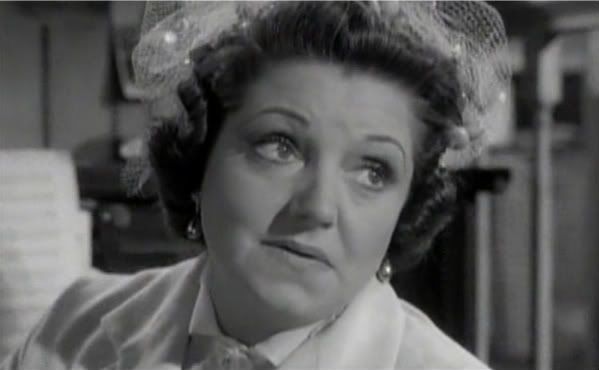 Indeed, Baddeley's performance -- perhaps Oscar's briefest nominated Supporting Actress performances -- also emerges among the category's most finely crafted and emotionally compelling. It's an absolutely worthy, enduring, and convention-defying nomination.
Indeed, Baddeley's performance -- perhaps Oscar's briefest nominated Supporting Actress performances -- also emerges among the category's most finely crafted and emotionally compelling. It's an absolutely worthy, enduring, and convention-defying nomination.

3 comments:
this film is well written, well directed, well shot.
And the acting... wow. Some very small performances that really stand out. [did anyone else notice the actress playing the Aunt? memorable].
I'm keeping my Baddeley thoughts for the Smackdown :)
now how about this pieces of trivia?? :) good for her.
Had a long, involved relationship with actor Laurence Harvey. They appeared together in the film Room at the Top (1959)
[on her real-life romance with 'Laurence Harvey' (I)] "Life with him was exciting and funny, but he was consumed with a hunger to have everything - fame, fortune, all the riches of life. It was as if he knew there was only so much time alloted to him."
[on Laurence Harvey] I think I shall risk the halibut. It can't be too awful, can it? After you've lived with Laurence Harvey, nothing in life is ever really too awful again.
I saw that about Baddeley/Laurence. I love the idea...
Post a Comment